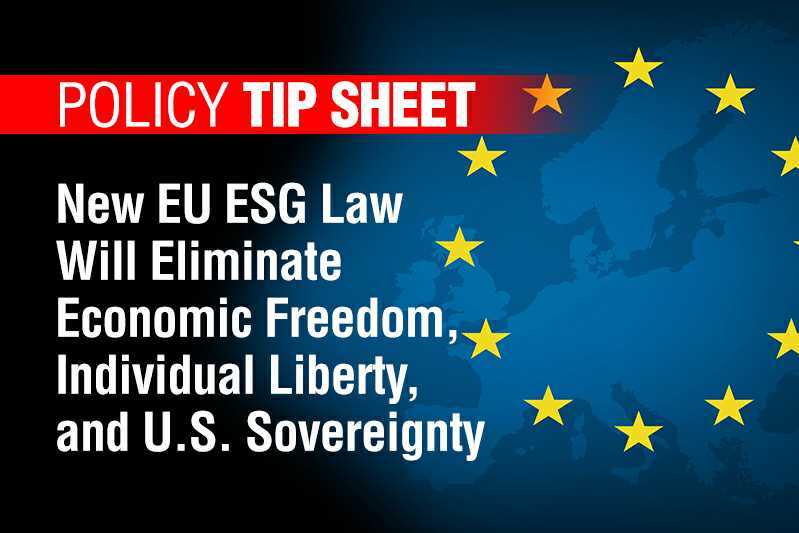(To read the full Policy Tip Sheet in PDF form, click here.)
In May 2024, after years of intense legislative negotiations, the European Union approved a sweeping new law called the Corporate Sustainability Due Diligence Directive (CSDDD).[1] The CSDDD was deliberately designed to transform business practices and, by extension, social and economic activities across the world, including in the United States.
This authoritarian directive, one of the most ambitious laws passed in recent memory, poses one of the greatest threats to freedom experienced by American families today.
How the CSDDD Works
The Corporate Sustainability Due Diligence Directive seeks to alter business and social behavior through global supply chains by establishing a set of environmental, social, and governance (ESG) rules[2]—typically referred to in the European Union as “due diligence” obligations—for large companies.[3] The CSDDD mandates that these large businesses impose ESG standards on companies operating within their “chain of activities,”[4] regardless of whether those “chain” businesses have operations within the European Union.
The CSDDD’s ESG mandates are detailed in some sections of the law, but in many provisions, the law enshrines vague statements about the environment, social justice causes, and economic responsibilities. Such vagueness was almost certainly deliberate, as the law requires individual EU countries to transpose the CSDDD into their own national laws by no later than July 26, 2026.[5] The CSDDD’s provisions are meant to establish a regulatory floor for all EU nations, but those countries have the power to make their laws stricter than what the CSDDD requires.
The CSDDD also mandates that companies comply with numerous provisions from other international agreements and EU laws, such as the 2011 UN Guiding Principles on Business and Human Rights, 2015 Paris Climate Agreement, and the Convention on Biological Diversity. Incredibly, the CSDDD contains at least 89 citations to various other governing documents and international agreements. This means that elements within all of these agreements will be imposed on companies that fall under the new EU due diligence law, in one form or another.
Because of the law’s complexity and vagueness, it would be impossible to list even 10 percent of the various ESG rules that the CSDDD will soon impose. However, to give readers a better understanding of what the law attempts to cover, we have included below a brief list of some of the policy themes addressed within the CSDDD:
- unions and collective bargaining
- wage and work standards
- health care and disease prevention
- children’s rights to education
- a mandate to avoid or mitigate adverse impacts on biological diversity
- a full transition to a “green energy” economy
- a mandate for companies to go “net zero” globally by 2050
- requirements for company climate transition plans
- reductions in the use of water and land
- far-reaching, vaguely worded social justice provisions
- bans on “disinformation” related to climate change and energy
- prohibitions on slave and child labor
Companies will be forced to adhere to the CSDDD in various tranches, with the largest companies having to comply by July 26, 2027. Two years from that initial date, by July 26, 2029, all affected companies will have been phased in.[7]
Businesses that fail to meet the requirements of the CSDDD will face financial penalties “not less than 5% of the net worldwide turnover of the company in the financial year preceding that of the decision to impose the fine,”[8] imposed by designated national supervisory authorities. For the world’s largest multinational corporations, this clause could amount to billions of dollars in fines for a single violation of the CSDDD.
Covered Companies
Businesses covered directly by the law include those based in the European Union that have at least 1,000 employees and a net worldwide turnover—which is roughly the same as a company’s total revenue[10]—greater than €450,000,000.[11] As of September 11, 2024, that is equivalent to approximately $495,000,000.[12] Companies based outside of the European Union are covered under the CSDDD if they have a net turnover of €450,000,000 within the European Union.
Many of America’s largest and most influential corporations will be covered by the CSDDD. For example, publicly available financial data suggest that Amazon, Apple, Cargill, Ford, Google, McDonald’s, Meta, Microsoft, and Sysco Foods will be among the U.S. corporations forced to comply with the CSDDD, among myriad others. There are some exceptions, however. The CSDDD explicitly excludes “regulated financial institutions” from having to conduct due diligence upon their business partners in their “downstream” chain of activities that receive their “services and products,”[13] such as loans and investments. This legal carve-out exempts many powerful financial entities from the obligations every other covered business is forced to adhere to, a clear sign of cronyism.
The direct impact of the CSDDD upon large U.S. corporations is enough to cause serious concerns on its own. However, the CSDDD does not stop there. The law’s most consequential provisions mandate that covered companies impose the CSDDD’s rules on most of their upstream and downstream business partners as well, no matter how small they are or how much revenue they receive from operations in the European Union, with limited exceptions.[14] As a result, thousands of American businesses that have no operations or sales within the European Union will likely be forced to comply with the CSDDD by their larger business partners.
Covered companies will be forced under the CSDDD to coerce the adoption of the law’s ESG mandates with their business partners through contractual assurances. If covered companies’ business partners fail to meet the CSDDD’s standards, the covered companies must end their relationships with their noncompliant partners or face penalties imposed by national supervisory authorities
A Massive Wealth Transfer
Remarkably, in cases where a small or medium-sized business partner’s compliance would pose significant danger to the viability of the company, the CSDDD does not typically allow for exceptions. Compliance is necessary. Instead of allowing business partners to go bankrupt, however, the due diligence law mandates that the larger, covered companies provide financial support to make compliance possible.
The CSDDD notes that covered companies “should … provide targeted and proportionate support” for a small or medium-sized (SME) business partner, “including by providing or enabling access to capacity-building, training or upgrading management systems, and, where compliance with the code of conduct or the corrective action plan would jeopardise the viability of the SME, providing targeted and proportionate financial support, such as direct financing, low-interest loans, guarantees of continued sourcing, or assistance in securing financing.”[16]
These provisions of the CSDDD would very likely cause one of the largest wealth transfers in history, as larger companies from wealthier nations would effectively be forced to pour cash into small and medium-sized companies around the world—all so that those companies can adopt ESG standards promulgated by the European Union.
The End of U.S. Sovereignty
America was founded by men and women seeking independence from the nations of Europe and their authoritarian, failed policies. Yet, as we approach nearly 250 years of freedom from European rule, the European Union is seeking to force the United States to give up that hard-earned sovereignty through the CSDDD.
If the CSDDD goes unanswered, America will become a vassal state of the European Union and be fundamentally transformed through corporate coercion. The way Americans work, the products and services they can buy, the kinds of cars they can drive, the source of their electricity, their food and agricultural practices, the living standards they enjoy, and countless other aspects of their lives will be altered for the worse by the CSDDD.
The Corporate Sustainability Due Diligence Directive must be stopped at all costs.
[1] European Council and Council of the European Union, “Corporate sustainability due diligence: Council gives its final approval,” Press Release, May 24, 2024, https://www.consilium.europa.eu/en/press/press-releases/2024/05/24/corporate-sustainability-due-diligence-council-gives-its-final-approval/
[2] For a full review of ESG systems in general and the threat they pose to democratic institutions, individual rights, and economic freedom, see: Jack McPherrin, “Environmental, Social, and Governance (ESG) Scores: A Threat to Individual Liberty, Free Markets, and the U.S. Economy,” The Heartland Institute, April 26, 2023, https://heartland.org/publications/environmental-social-and-governance-esg-scores-a-threat-to-individual-liberty-free-markets-and-the-u-s-economy-2/
[3] Except as otherwise noted, the citations for the remainder of this Tip Sheet are drawn directly from provisions within the Corporate Sustainability Due Diligence Directive, annotated as EU CSDDD in subsequent citations. See “Directive (EU) 2024/1760 of the European Parliament and of the council of 13 June 2024 on corporate sustainability due diligence and amending Directive (EU) 2019/1937 and Regulation (EU) 2023/2859,” Official Journal of the European Union, https://eur-lex.europa.eu/legal-content/EN/TXT/?uri=CELEX%3A32024L1760
[4] EU CSDDD, Directive, Article 3.
[5] EU CSDDD, Directive, Article 37.
[6] Some of these policy goals are accomplished within the legally binding language of the EU CSDDD, while others are contained within the CSDDD’s “whereas clause,” cited as the “preamble” in this document, which has 99 separate provisions. Though it is uncertain whether the provisions contained within the whereas clause are as legally binding as the main text of the Directive, we anticipate such provisions to be included within EU countries’ national legislation upon transposition.
[7] EU CSDDD, Directive, Article 37.
[8] EU CSDDD, Directive, Article 27.
[9] CSDDD, Directive, Article 29.
[10] According to Investopedia, “overall turnover is a synonym for a company’s total revenues. It is a term that is most commonly used in Europe and Asia.” See: Adam Hayes, “What Is Overall Turnover?” Investopedia.com, January 26, 2023, https://www.investopedia.com/terms/o/overall-turnover.asp
[11] EU CSDDD, Directive, Article 2.
[12] Xe.com, “Xe Currency Converter,” accessed September 11, 2024, https://www.xe.com/currencyconverter/
[13] EU CSDDD, Preamble, Article 26,
[14] EU CSDDD, Directive, Article 3.
[15] EU CSDDD, Directive, Article 10.
[16] EU CSDDD, Directive, Article 11.





